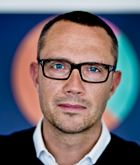Guardian global boss takes shot at rivals for lack of digital adaptation
 The man in charge of the international editions of The Guardian, David Pemsel, has admitted new media organisations like Buzzfeed and Mashable “have changed the news ecology” and insisted native advertising is consistent with the brand, as long as it is labelled well.
The man in charge of the international editions of The Guardian, David Pemsel, has admitted new media organisations like Buzzfeed and Mashable “have changed the news ecology” and insisted native advertising is consistent with the brand, as long as it is labelled well.
In a wide ranging interview with Mumbrella, deputy managing director of The Guardian Pemsel said the group was also considering the possibility of launching its dating site, Guardian Soulmates, in other markets, as it looks to go beyond “anonymous user data” and learn more about its audience, in addition to rolling out a redesigned website and mobile apps in the next quarter.
He also took a swipe at rivals which needed to satisfy shareholders, saying they had not managed to make the transition to the digital age, adding: “In that world you’ve got to be able to come up with soundbites like ‘print’s very strong’ to keep the shareholders off your back.”
As part of its drive to deepen engagement with and find data about its readers the company is rolling out more events in Australia in 2015, having already established a Masterclass series. Readers are now able to sign up to memberships and even become patrons of the masthead, in a bid to drive deeper connections with readers, and harness more data.


Where is the evidence that the guardian version of digital ‘first’ is superior? Nothing new in this story aside from the threat of yet another dating site.